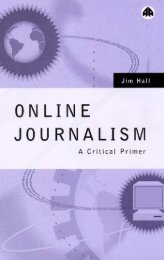Modul Mata Kuliah Journalisme Online - Ayo Menulis FISIP UAJY
Modul Mata Kuliah Journalisme Online - Ayo Menulis FISIP UAJY
Modul Mata Kuliah Journalisme Online - Ayo Menulis FISIP UAJY
You also want an ePaper? Increase the reach of your titles
YUMPU automatically turns print PDFs into web optimized ePapers that Google loves.
You, and Ed Wasserman, are probably wondering what all this citizen journalism talk has to do with his<br />
column complaining about all the journalists who are being fired in the name of ethics. I think<br />
everything. The debate about citizen journalists and professional journalists is all about ethics and<br />
standards. As journalism standards are weakened by blogs and the 24/7 rush of news, mainstream<br />
media has to be the standard-bearer for ethics and impeccable behavior. Certainly, we have a long way<br />
to go.<br />
Ed’s piece is must reading. He argues that editors have been too quick on the trigger to fire people for<br />
ethical transgressions and he goes into specifics. The piece is a little absolutist for my taste and more<br />
than a bit populist. Running a newsroom is tough work and the people he skewers are balancing a lot of<br />
considerations. I didn’t find it very understanding of leadership challenges.<br />
I taught with Ed Wasserman at Washington and Lee University for 6 weeks in 2005 when I was the first<br />
Reynolds visiting professor at that fine school. My passionate debates with Ed were a true highlight of<br />
my short stay and I’m smart enough to know those debates are best conducted in person and not<br />
through the blogosphere. And in this case, I agree with a lot of of Ed’s specific examples, and I agree<br />
absolutely with his conclusion that ethical action "demands acting justly with proportionality, fairness<br />
and compassion. Forgiveness is a good thing in the news and newsrooms." That is inarguable. I’d go a<br />
step further and say forgiveness is an ethical principle we too often forget.<br />
I agree with Ed, too, that risk is important in these tumultuous times. I am just as convinced that, rather<br />
than being arrogant bullies, many newsroom leaders are trying to sort out the newspaper’s place in the<br />
media landscape. Ethical behavior is the place to start. Ed is correct that proportion and compassion are<br />
required. Adherence to an ethical code that distinguishes us from bloggers and some cowboy citizen<br />
journalists is also essential.<br />
I am glad Ed is calling some firings into question. He always was a great conversation starter. I simply<br />
want to assure that the conversation is a complete one. The effort to establish that mainstream media<br />
stands for ethical behavior is a noble goal. How we set those standards and enforce them should always<br />
be open to debate. The need for standards to allow us to rise above the crowd should not be. It is how<br />
readers are going to distinguish the pros from the amateurs as we move forward.<br />
Alan Kania<br />
Posted November 29, 2007 at 9:20 am | Permalink<br />
Tomorrow I catch up to Tim’s age and while not by choice, I’m a retired journalist. Why is it that<br />
we retirees speak wisdom once we leave the news room? Why don’t working journalists do that<br />
now?<br />
Ethical journalism as a means of guiding mainstream and so-called citizen journalism? Perish the<br />
thought of such a radical concept? How many journalism organizations have codes of ethics and<br />
how many news organizations follow them? How many journalists have even read the series of<br />
“State of the Media” and other reports about why people are tuning out or canceling their news<br />
subscriptions?
















